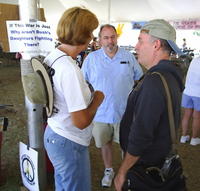Howard Dean's strategy of fighting the Right's power structure in every district and every state has been making waves, big ones, in places which the professional losers who have been in control of the Democratic Party inside the Beltway have long written off. In the past couple of months I've had articles of Dean-inspired Democratic shake-ups in North Carolina, Ohio and Montana. And now... Mississippi.
ONE STATE AT A TIME
by Rose Aguilar, AlterNet
August 23, 2005
Mississippi Democrats are showing the potential power of Howard Dean's '50-state strategy' to take back national politics.
It's been six months since Howard Dean visited Jackson, Mississippi, but locals are still talking about his fiery speech in which he criticized President Bush's plan for social security and said Republicans are doing nothing to help the people of Mississippi.
"Every seat was filled. There were people standing around the room and people outside who couldn't get in," says Joanne Morris, an editor and writer living in Jackson. "He got an absolutely fantastic reception. I'm sure he must have been surprised. I was surprised myself. People were just jubilant."
Dean's speech revitalized scores of Mississippi Democrats who are sick of being ignored by the national party. "We're also written off in the media; they either skip over us or stereotype us," says Dorothy Triplett, secretary of the Mississippi Democratic Club, a group of progressive Mississippians. "We're finally saying, 'Hey, wait a minute, we're here and we're not going anywhere.' I think we can be a real asset to the national party and I'm delighted that they're finally giving us some attention."
As part of Dean's 50-state strategy, the Democratic National Committee is hiring staffers to join state party offices that typically run on shoestring budgets with few employees, including in Mississippi, North Carolina and Oklahoma.
"Because of his commitment, we'll be able to increase our staff by 300 percent, so to speak," says Keelan Sanders, executive director of the Mississippi Democratic Party. Before the new hires showed up, Sanders was the party's only staffer. "It is definitely helping the state party with needed resources so we can begin organizing and getting the message out."
Constructing that message won't be easy. It's been 28 years since Mississippi gave its six electoral votes to a Democrat; Bush got 60 percent of the vote in Mississippi. Democrats hold more county elected positions and legislative seats than Republicans, but the governor, lieutenant governor and the state's two senators are members of the GOP.
"Mississippi is ripe for the picking. They're either 49th or 50th in every statistical category. Per capita income is low. Poverty levels are high. Medicaid is a huge issue here," says Jay Parmley, former chair of Oklahoma's Democratic Party.
Parmley is spending a few months in Jackson helping the Mississippi Democratic Party. "What I'm finding here is that the message of our party, if delivered right, is what people want to hear. Can it be done quickly? No, but at least I can try to get people talking to each other again. So much of our party is that we all think we're important and we all have our own issues."
Parmley was one of the first state Democratic chairs to endorse Howard Dean. The announcement drew criticism from all sides of the political spectrum in Oklahoma, a state where John Kerry failed to win one county. "I started out thinking Dean was not what we needed. But the more I kept talking to him, the more I realized that this guy gets it. He understands that it's a 50-state strategy. He understands that those of us in Oklahoma and Mississippi aren't getting any help," says Parmley. "We need to build stronger state parties. He found out that most state parties only have one or two staffers, they're in dilapidated buildings and they're not raising any money. How are you supposed to communicate with people? Yahoo may be free, but you've got to build an infrastructure."
Sam Hall, a newly hired communications director for the Mississippi Democratic Party, is working with the state legislature on crafting policy messages. "Neither the House nor the Senate has a large communications apparatus," says Hall, a former journalist and political columnist. "After years of being a one-party state, we are now a two-party state and we need to start organizing."
In many Southern states, Democrats rarely take a strong stance on issues like abortion and gay rights, and end up delivering muddled messages that fail to distinguish them from Republicans. "My personal frustration with Democratic candidates is that they're always afraid they're going to offend someone. In the South, we run from pro-choice positions," says Parmley. "What we're doing is basically telling the electorate that we don't believe in anything and they don't vote for us. I'm not discouraged, but I get real upset with candidates. If you're a Democrat, I expect you to be able to say why you're a Democrat."
"One of the problems with Mississippi is so many of the state's Democrats aren't really Democrats," says Robert Hooks, President of Mississippi's Young Democrats. "Democrats in Mississippi need to take Howard Dean's lead and stand up for what they believe in."
Three years ago, Mississippi's Young Democrat group only existed on paper. Today it has 64 organized chapters in high schools, colleges and counties across the state. The state's young voters led the South, and much of the nation, in the percentage that voted for Kerry (63 percent) over Bush (37 percent). "We're a new generation of young voters that identifies ourselves as national Democrats, not southern Democrats," says Hooks.
Hooks says Dean's visit in March struck a nerve with college students. "The Democratic Party went from being stagnant for 10 years to finally moving forward," he says. "The DNC's financial effort is the last chance we have. If the state party can modernize, we have a tremendous chance of drop-kicking the Republicans. If it chooses to hold on with a death grip and is not willing to change, this movement will be for nothing."
Jay Parmley agrees. "I see this as a one shot deal. Does it mean if we miss the shot, it'll be over? I don't know, but I do know it'll be a long, long time before we win if that happens. Now is the perfect time to recreate the party."





